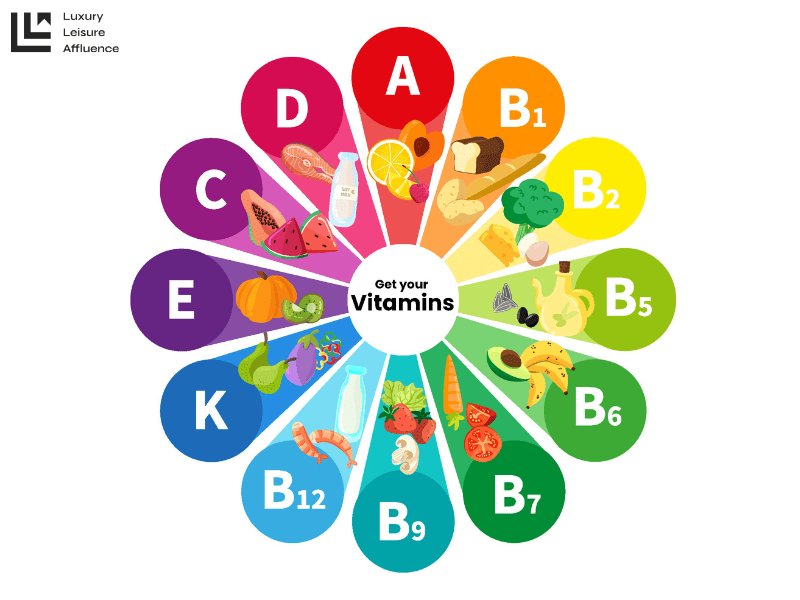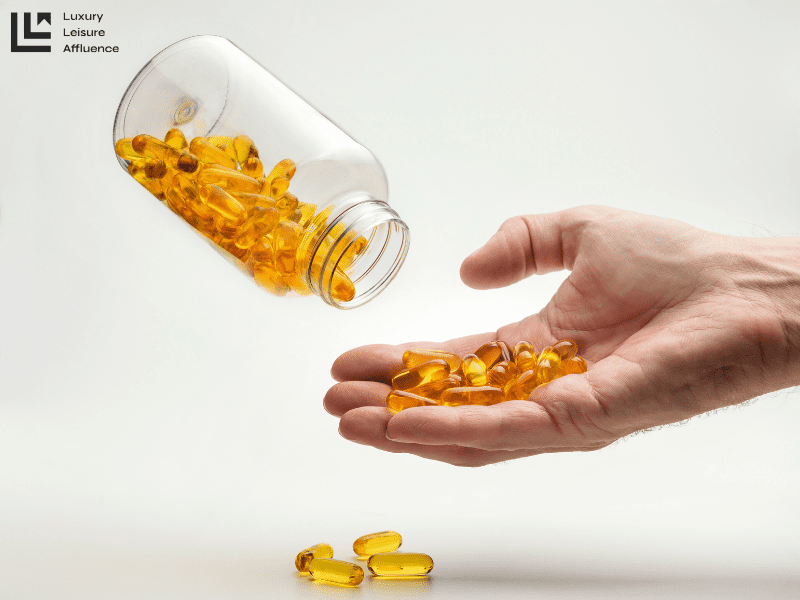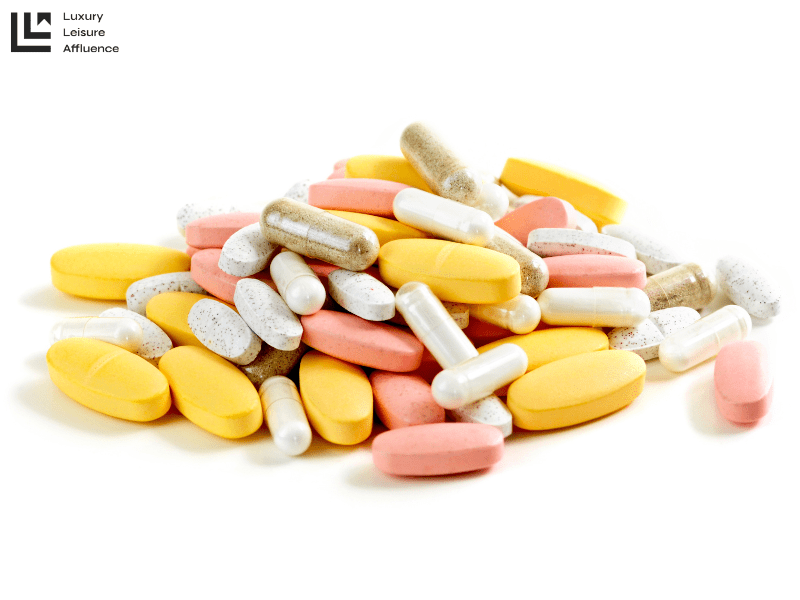Updated On: February 09, 2024 by Raghda Elsabbagh
Our quest for optimal nutrition has given rise to many vitamin brands, each vying for consumer attention and loyalty. While affordability often factors into the decision-making process, a niche market exists where exclusivity, superior quality, and prestige take precedence over price considerations.
This blog post delves into a list of the most expensive vitamin brands, exploring the factors contributing to their elevated status and the unique attributes that distinguish them in the crowded market.
Different Types of Vitamins

Vitamins are essential organic compounds the body requires in small amounts for various physiological functions. They are crucial in metabolism, growth, immune function, and overall well-being. Vitamins are typically categorised into two main types based on their solubility: water-soluble and fat-soluble. Here’s an overview of the different types of vitamins:
Water-Soluble Vitamins
Water-soluble vitamins comprise vitamins B and C.
Vitamin C (Ascorbic Acid)
- Functions: Antioxidant, collagen synthesis, immune function, iron absorption.
- Sources: Citrus fruits, strawberries, bell peppers, broccoli.
B-Vitamins
The B Vitamins family include:
- B1 (Thiamine): Energy metabolism, nerve function
- B2 (Riboflavin): Energy production, skin health
- B3 (Niacin): Energy metabolism, DNA repair
- B5 (Pantothenic Acid): Hormone synthesis, energy production
- B6 (Pyridoxine): Amino acid metabolism, neurotransmitter synthesis
- B7 (Biotin): Metabolism of fatty acids, amino acids
- B9 (Folate): DNA synthesis, red blood cell formation
- B12 (Cobalamin): DNA synthesis, nerve function
- Sources: Whole grains, meat, dairy, leafy greens, nuts
Fat-Soluble Vitamins
The fat-soluble vitamins are vitamins A, D, E, and K.
Vitamin A (Retinol)
- Functions: Vision, immune function, skin health.
- Sources: Carrots, sweet potatoes, liver, spinach.
Vitamin D
- Functions: Calcium absorption, bone health, immune function.
- Sources: Sunlight exposure, fatty fish, fortified foods.
Vitamin E (Tocopherol)
- Functions: Antioxidant, cell membrane protection.
- Sources: Nuts, seeds, vegetable oils, spinach.
Vitamin K
- Functions: Blood clotting, bone metabolism
- Sources: Leafy greens, broccoli, liver
Do We Always Need to Take Supplements?

No, not necessarily. A balanced diet containing various foods is generally sufficient to meet the body’s vitamin needs. In some cases, supplementation may be recommended under healthcare professionals’ guidance, especially for individuals with specific health conditions or dietary restrictions. It’s best to consult with a healthcare provider before starting any new supplement regimen.
Why are There Expensive Vitamin Brands?
The cost of vitamins can vary for several reasons. Here are some factors that contribute to the cost and quality of vitamins:

Quality of Ingredients
At the heart of manufacturing vitamins lies a commitment to sourcing the finest ingredients and utilising advanced formulations. Some vitamin brands prioritise excellence in every aspect of their products, from bioavailable forms of vitamins to unique blends that enhance absorption. The cost is often reflective of the use of rare or specialised ingredients and the incorporation of synergistic compounds that amplify the health benefits of the vitamins.
Research and Development (R&D)
The most expensive vitamin brands are the culmination of meticulous research, cutting-edge technologies, and uncompromising dedication to perfection. These brands invest significantly in research and development, exploring optimal formulations, identifying effective and bioavailable forms of vitamins, and utilising the latest scientific advancements to create products that transcend conventional standards. Here are ways in which the R&D phase impacts the cost of vitamins:
- Scientific Research: Companies invest in scientific research to understand different vitamins and minerals’ bioavailability and health benefits. This research helps in selecting the most effective and absorbable forms for inclusion in supplements.
- Clinical Trials: Rigorous clinical trials are often conducted to test the safety and efficacy of new formulations. These trials can be expensive but are essential for establishing the credibility of a product and ensuring it meets regulatory standards.
- Formulation Development: Creating a well-balanced and effective formulation involves researching the synergistic effects of different nutrients and determining the optimal combination and ratios. This process can be resource-intensive and time-consuming.
- Quality Control Processes: Developing stringent quality control processes to ensure the consistency and purity of the final product is part of the R&D phase. This involves investing in testing methods and equipment.
- Compliance with Regulations: Ensuring that the vitamin complies with regulatory standards and requirements involves research into local and international regulations. This knowledge is crucial to developing a product that can be legally sold in various markets.
- Innovation and Technology: Companies invest in innovative technologies and delivery systems to enhance the effectiveness of their supplements. This could include developing new forms of capsules, tablets, or other delivery methods that increase bioavailability.
While the R&D phase contributes to the overall cost, it is an essential investment for companies to produce safe, effective, and high-quality vitamin supplements. Consumers benefit from this investment through products backed by scientific research, have improved formulations, and adhere to rigorous quality standards. However, these costs are part of the overall expenses borne by supplement manufacturers and may influence the final retail price of the products.
Manufacturing Processes
Producing high-quality supplements often involves quality control and adherence to Good Manufacturing Practices (GMP). These processes can increase production costs. Quality control is paramount for these brands, and they employ rigorous testing protocols to ensure the purity and potency of their products. Expensive vitamin brands and high-quality supplements often undergo third-party testing for purity, potency, and quality. Look for products that display seals from organisations like NSF, USP, or Informed-Choice. They also ensure transparent labelling that clearly lists the amounts and forms of each nutrient and any additional ingredients. This provides consumers with a level of transparency and assurance that is unparalleled in the industry.
Dosage and Formulation
Supplements with higher dosages or complex formulations (combining multiple vitamins and minerals) may be more expensive due to the complexity of manufacturing and the quantity of ingredients. Capsules, soft gels, or time-release formulations can increase the cost of production. Higher-quality supplements often contain fewer unnecessary additives, such as fillers, preservatives, or flavourings.
Packaging and Presentation
The most expensive vitamin brands understand the importance of aesthetic appeal and exclusivity. Lavish packaging, often designed by renowned artists or housed in collectable containers, transforms taking vitamins into a luxurious experience. The attention to detail in the presentation contributes to the overall perception of these supplements as objects of desire.
Brand Reputation
Beyond the product itself, the brand’s reputation plays a pivotal role in justifying its exorbitant price tag. Well-known brands often boast a history of excellence, a commitment to sustainability, and a dedication to ethical practices. The association with a prestigious brand becomes a status symbol, elevating the supplementing routine to a luxurious and sophisticated lifestyle choice.
The Targeted Consumer
The consumer base for the most expensive vitamin brands is typically discerning and affluent. These individuals prioritise health and wellness, viewing the investment in premium supplements as a proactive approach to maintaining optimal well-being. The allure of exclusivity and the promise of superior health benefits make these brands attractive to those seeking the epitome of nutritional excellence.
9 of the Most Expensive Vitamin Brands
Here’s a list of some of the most expensive vitamin brands currently available.
Lyma
Lyma is known for its use of highly bioavailable ingredients and advanced formulations. The brand emphasises the importance of targeted nutrients for optimal health and wellness. Lyma’s formulation includes a blend of clinically proven ingredients, such as KSM-66 Ashwagandha (the most natural and bioavailable form of ashwagandha) and HydroCurc (the most bioavailable form of curcumin on the market), designed to enhance absorption and effectiveness. Lyma supplements can range from $200 to $600 per bottle, and these high prices may be a barrier for some consumers.
Thorne
Thorne Research is recognised for its commitment to quality and efficacy. The brand often uses high-quality, hypoallergenic ingredients and undergoes rigorous testing. Thorne’s distinction lies in its emphasis on research-backed formulations; healthcare practitioners frequently recommend the brand. Thorne supplements’ prices can range from $30 to $100 per bottle, which is considered relatively expensive compared to other brands.
Pure Encapsulations
Pure Encapsulations is known for its hypoallergenic formulations without unnecessary additives, catering to individuals with sensitivities. The brand often uses. The brand stands out for its commitment to minimalism and to using pure, high-quality ingredients. Prices typically range from $10 to $200 per bottle, and availability can be limited in certain regions.
Vibrant Health
Vibrant Health emphasises innovative formulations, whole-food ingredients, and nutrient-dense plant elements. The brand often incorporates unique blends for comprehensive nutrition, catering to those seeking a holistic approach to supplementation. Vibrant Health supplements can range from $20 to $80 per bottle.
Ritual
Ritual is known for its transparency and the use of high-quality, traceable ingredients. The brand targets specific nutrient gaps in the average diet. Ritual’s innovative delayed-release capsule design ensures optimal absorption and minimises the risk of nutrient interactions. Ritual supplements are typically priced around $20 to $150 per bottle.
HUM Nutrition
HUM Nutrition offers personalised recommendations based on individual health goals. The brand’s emphasis on beauty from within sets it apart, offering supplements to enhance skin, hair, and overall well-being. Prices vary, but HUM Nutrition supplements can range from $20 to $50 per bottle. Some customers may find the cost per product relatively high, especially when using multiple supplements.
Garden of Life
Garden of Life is distinguished in using organic and non-GMO ingredients in its formulations. The brand is known for its commitment to sustainability and whole-food-based formulations. Garden of Life supplements typically range from $10 to $70 per bottle, which is considered higher than conventional supplements.
Llama Naturals
Llama Naturals specialises in gummy vitamins made from natural food sources. The brand stands out for its commitment to providing a tasty and enjoyable alternative to traditional vitamin supplements, particularly for those who struggle with pills, including children and adults. Prices of this brand’s vitamins range from $20 to $35 per bottle.
Full Well
Full Well focuses on creating personalised vitamin packs based on individual health needs, catering to those who prefer a tailored approach to their supplement regimen. Prices for Full Well can range from $20 to $90 per personalised pack, which is pricier compared to generic multivitamins.
Are Expensive Vitamin Brands Always Better?

The answer is: Not necessarily. And here’s why:
1. A Higher Price Doesn’t Guarantee a Better Product
The notion that a higher price equals superior quality is not always accurate. While expensive vitamin brands often invest in advanced research, premium ingredients, and rigorous quality control processes, it does not necessarily mean their products are more effective or suitable for everyone.
Some well-established brands may command a premium based on their history and image rather than the intrinsic quality of their products. Additionally, marketing strategies, such as celebrity endorsements or exclusive partnerships, can contribute significantly to the overall cost without necessarily enhancing the nutritional value of the supplements.
Moreover, some affordable vitamin brands prioritise quality and transparency, utilising effective formulations and adhering to stringent manufacturing standards. Third-party testing and certifications for purity and potency are not exclusive to expensive brands; many mid-range and budget-friendly options also prioritise these aspects.
Consumers should scrutinise product labels, look for third-party certifications, and consider independent reviews to assess the actual value of a supplement. Understanding the ingredients, their forms, and their bioavailability is definitely more informative than relying solely on the price tag.
2. We Are Different, Expensive May Not Always Be Better for You
Consumers’ health needs, dietary preferences, and responses to different formulations vary significantly. What works for one person may not necessarily work for another, and the most expensive vitamin brands might not align with everyone’s unique requirements.
For some individuals, specific health conditions or dietary restrictions may necessitate using particular forms or combinations of vitamins, which may or may not be present in more expensive supplements. Additionally, some people may be more sensitive to certain additives or excipients in high-end formulations.
Affordability is a crucial consideration for many consumers, and opting for an expensive supplement may not always be financially viable or necessary. Many budget-friendly options provide essential nutrients in forms that are well-absorbed by the body, meeting the basic nutritional needs of a diverse range of individuals.
Individual health goals, lifestyle choices, and existing health conditions should guide the selection of supplements rather than relying solely on the price or prestige of a brand. Consulting with a healthcare professional can help tailor supplement choices to specific needs, ensuring that the selected vitamins align with individual health needs and potential interactions with medications or existing health conditions without unnecessary financial strain.
In conclusion, while some expensive vitamin brands offer premium quality, consumers should approach supplement selection with a discerning eye. The key is to prioritise personal health needs, scrutinise product labels, and consider factors beyond price when evaluating the overall value of a vitamin supplement.











